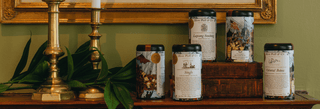The “Bay is a more dangerous Navigation than the open Sea,” wrote the Charles-Town native Henry Laurens on January 21, 1774 in a letter to his son John, of the colonists’ refusal to import British tea. In his letter, Laurens enclosed a clipping from a newspaper informing John of the Boston Tea Party, as it would later be called. Laurens explained that the people of Boston dumped 342 chests of tea carried by the East India Company into the ocean.

The East India Company attempted to continue making deliveries to the colonies even though their captains and ships carrying the traitorous tea were unwelcome in the colonies’ harbors.[1] The sentiment of Laurens’ letter to his son suggests that, like the bay of Charles-Town, captains transporting the East India Company’s tea knew better than to arrive in Boston. The stance on the tea tax that had motivated the action of the citizens in Boston was also shared by Charles-Town’s citizens. The citizens’ reaction to the arrival of tea the next year suggests that their chosen method for disposal was inspired by Boston’s tea party.
Prior to Boston’s tea party, Charles-Town encountered an arrival of the “malicious” tea on board Captain Curling’s ship London, commencing their “first Tea Party” in December of 1773.[2] During Charles-Town’s first tea party, the citizens quickly settled and ensconced the tea chests that arrived on the London; however, the event was not recognized as monumental as Boston’s more famous protest.
On November 1, 1774, the ship Britannia arrived in Charles-Town’s bay captained by Samuel Ball, Jr. The “Minds of the People appeared to be very much agitated” when the tea that would cost them their sovereignty, pride, and money dared to be unloaded.[3] Throughout Charles-Town, accusations made against Captain Ball followed this threat. Many stipulated that he was aware, since leaving London, that chests of tea were present on his ship. Others identified Captain Ball’s actions as devious and suspicious, and accused him of seeking to trick them into partaking in Parliament’s unfair tea tax.
The Committee of Observation, a committee that oversaw and corrected the conduct in Charles-Town, was immediately informed of this crisis. Instantly, the Committee refused to condone the unloading of the stowaway tea off Britannia. The next day, the Committee held a meeting to deliberate the arrival of the “fugitive.” Faced with the odious tea, the Committee members unanimously expressed their many concerns and astonishments of the present predicament.[4] Each minute the Committee continued to deliberate, the tension throughout the city rose and the citizen’s fervor banded them together against the tea that was now on their shore.
Before the Committee of Observation, Captain Ball protested the accusations that he was aware his ship carried seven chests of tea consigned to the local Charles-Town merchants: Mr. Zephaniah Kinstey, Mr. Robert Mackenzie, and Mr. Robert Lindsay. Captain Ball did not deny “having the mischievous Drug on board” when it was brought to his attention. In his defense, Captain Ball confessed that “his Mate had received them in his Absence” and testified that he tried to fix the situation to clear himself from “the suspicion of having any Design to act contrary to the Seale of the People here, or the Voice of all America.”[5] To his relief, Captain Ball’s argument spared him from the fate given to those who were forced to go back out to sea, “but for what port, nobody knew.” As Henry Laurens stated in his letter, those captains “will find no hospitable Anchorage in any [port] upon the Continent.”[6]
The Committee of Observation ruled that the merchants who had ordered the tea were to dump the entire contents of their chests over the side of the Britannia and into the water as a sacrifice to “NEPTUNE.” As the tea was destroyed, many citizens stood on the shore watching, and immediately dispersed after the dumping, “as if nothing had happened.” [7]



